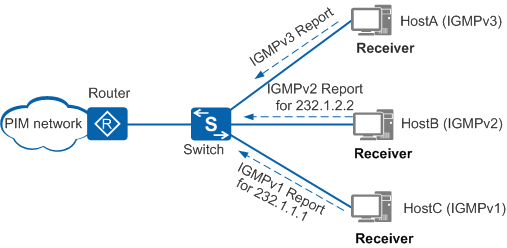IGMP Snooping SSM Mapping
Compared to any-source multicast (ASM), source-specific multicast (SSM) conserves multicast addresses and is more secure. Only IGMPv3 supports SSM. A host running IGMPv3 can specify multicast source addresses in IGMP Report messages. Some hosts can run only IGMPv1 or IGMPv2. To enable such hosts to obtain the SSM service, multicast devices must provide the IGMP snooping SSM mapping function.
IGMP snooping SSM mapping is Layer 2 SSM mapping on an IPv4 multicast network. After static SSM mapping entries are configured on a multicast device, the device can convert (*, G) information in IGMPv1 and IGMPv2 Report messages to (S, G) information to provide the SSM service for IGMPv1 and IGMPv2 hosts. S indicates the multicast source, G indicates the multicast group, and the asterisk (*) indicates any multicast source. By default, SSM group addresses range from 232.0.0.0 to 232.255.255.255. You can configure an SSM group policy to change the SSM group address range.
In Figure 1, HostA runs IGMPv3, HostB runs IGMPv2, and HostC runs IGMPv1. HostB and HostC cannot run IGMPv3. To provide the SSM service for all the hosts on the network segment, IGMP snooping SSM mapping must be configured on the switch.
The following table lists the SSM mapping entries configured on the switch.
Multicast Group Address |
Mapping Multicast Source Address |
|---|---|
232.1.1.0/24 |
10.10.1.1 |
232.1.2.0/24 |
10.10.2.2 |
232.1.3.0/24 |
10.10.3.3 |
When the switch receives Report messages from HostB and HostC, it checks whether the multicast group addresses in the messages are within the SSM group address range. If so, the switch generates (S, G) entries based on the SSM mappings, as shown in the following table.
Multicast Group Address in IGMPv1/IGMPv2 Report |
Multicast Forwarding Entry |
|---|---|
232.1.1.1 (from HostC) |
(10.10.1.1, 232.1.1.1) |
232.1.2.2 (from HostB) |
(10.10.2.2, 232.1.2.2) |
When the multicast group address in a Report message is within the SSM group address range, but the switch has no SSM mapping entry matching the address, it does not provide the SSM service and drops the Report message.
If the multicast group address in a Report message is out of the SSM group address range, the switch provides only the ASM service.

If an upstream IGMP querier exists on the network, Layer 2 SSM mapping must be combined with Layer 3 SSM mapping on the IGMP querier to ensure multicast data forwarding. You must configure Layer 3 SSM mapping entries on the IGMP querier.
